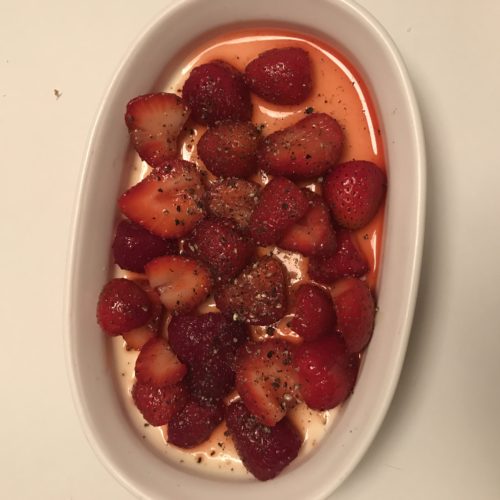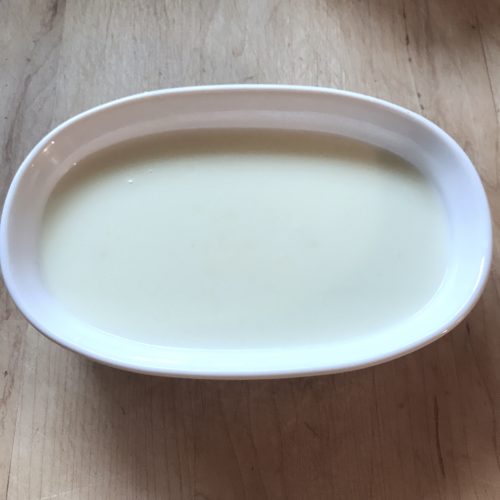
Forget the red, erase it. Before bloodied by berries, its surface was white. But unlike that of cottage cheese, coconut flesh, or the armor around my eyeballs, this white is negative, an abrogation. When finally chilled, my dish frightened me, at the same time I saw that the recipe worked and cookie should have been pleased.
Here’s where Lady Macbeth usually appears, her “posset” mention:
The doors are open, and the surfeited grooms
Do mock their charge with snores.
I have drugg’d their possets
That death and nature do contend about them,
Whether they live or die.
My own appetite went into an unsure zone. Can something you desire be an absence?
If it seems I’m exaggerating, understand that whatever tongues and palates do, senior eyes see things their own way. The gelid top was silent, like the ice of Virginia Woolf’s fantastic frozen Thames, numbing the kitchen around it. Blackness, the usual veener of nothing, is background here; whiteness smothers.
Silly, a dessert can’t do that, extract life, but it did, with three, maybe four, ingredients if you include zest, a word that can’t even think to apply itself to the project. As it happens, language, not color, moved me to make nothing out of something, because our treat is called, as the heartless one said, a posset.
Little British beast from the bestiary, cross between possum and marmoset, easier to train than its tipsy relation, the seven-toed syllabub. Posset was a drink that in the 16th century solidified, a sheer nightmare with emollient richness I can only say is a spoonful of lacks — texture, diversity, surprise — that stops everything. On its face, raw tofu comes close, until you cut, taste, wake up.
No matter the result, everyone wants a recipe, which rhymes with simplicity.
This one’s trinity sounds both virtuous and dangerous to health. Readers may laugh, because the unnatural nature of cooking grabs ridiculous old things and diverse new ones out of the cupboard and off Earth’s shelf.
Cream, sugar, lemon juice. In the case of posset, proportions have history on their side, until you go back to a predictable creation myth: drowsy serf milker squeezes stream into half-full ale pail by mistake. Curds float up in clouds, but who thought to save and sip the breakfast mess?
Ale was food then.
After liquid posset lost curative charm — warm boozy milk can do only so much — and “posseting” was used to describe what a baby does after too full a feeding, the potion coalesced into Wilde politeness, something we now refrigerate, serve and assume curious American guests will say is panna cotta or crème without brûlée.
A single word is better. I am looking for rhymes other than cosset, but you’ll find them faster, because I’m stuck stirring every few seconds to make sure the cream doesn’t boil over, as it always has.
Let’s put the recipe here, which is not mine. Whatever the source, posset instructions are alike, more assumed than copied. I can even write without a list.
For four.
Put two cups heavy cream in a saucepan, add two-thirds cup sugar, or vice versa. Juice two medium lemons to get about one-third cup and hold aside.
Option: Scrape zest from lemons you use and add, but you’ll need to strain.
Heat on medium to low, stirring till sugar dissolves, and let bubble for five minutes or a bit more, making sure the pot doesn’t boil over — which it will, I’m not being flip. By the way, boiling and simmering are not as different as all that, whatever you read.
Remove from burner, [strain and] add juice, stir, let cool, then pour into yard-sale ramekins or anything you have. Chill for a few hours, even longer, until top becomes slick and strange, like a blank, lit movie screen or last century’s North Pole. It shouldn’t wobble. You’ll wonder that cooking made the parts less, not more.

You eat posset when hunger is a farewell wave on the horizon, but still in view. Yes, you can cloak posset with macerated, spoon-bruised fruit and black pepper, or whatever fear of plain requires.
Macerate? Lime juice or tony vinegar, maybe bourbon, bitters, salt. You are the artist now, in an hour.
When I scooped a taste before prettification, I was brought, in pleasure, to a welcoming teat. That’s why kitchens should have couches, for swooning. Then I moved quickly to another place, a rich void, eating nowhere.

I don’t know about the dish–although the ingredients and the photo look/sound delicious–but boy, i love the literary references. Makes me grateful again for being a life-long English major. Your writing is lucious (I can’t remember the last time i used that word.)